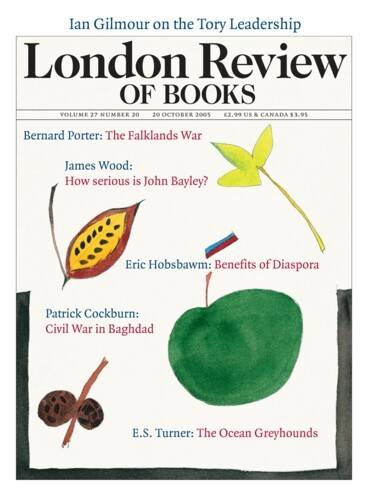The first rule when concocting a conspiracy theory is not to make any claims that can be proved not to be true. It won’t do, for example, to assert that John Kennedy was shot by Jackie Kennedy, because it’s clear from the film footage of the assassination that he wasn’t. Of course, you could make a case for that footage being faked, but how then would you account for eyewitness reports? Best not to go there. A decent conspiracy theory is made up of hard facts; the invention lies in drawing the connections. For example: Diana, Princess of Wales and campaigner against landmines, died in mysterious circumstances in Paris in August 1997; in July 1998, Brazil’s star striker, Ronaldo, fell mysteriously ill the night before the World Cup final at the Stade de France in Paris, a match in which France defeated Brazil 3-0; on the same day, David Ginola, retired French footballer and sometime L’Oréal model, became the new face of the anti-landmine movement. So far, so unconnected. But now let’s posit the existence of a mysterious secret organisation working tirelessly and ruthlessly to improve the fortunes of French footballers, an organisation so shadowy that not even the players themselves know of its activities or existence.
So far as I know, this theory has no subscribers – yet. Though I’m sure it would acquire a few thousand if Dan Brown were to write a novel based on it. Conspiracies lend themselves well to works of fiction: plots make for good plots. The best conspiracy-theory novels – Gravity’s Rainbow, for example – contain more fact than at first seems credible. But lots of people are dispiritingly willing to believe any old nonsense. This doesn’t much matter when the nonsense is The Da Vinci Code. It’s more of a problem when it’s something like the most notorious and pernicious fictional conspiracy-theory document of the 20th century, The Protocols of the Elders of Zion.
The Protocols, which poses as an instruction manual for Jewish world domination, was first published in 1903, serialised in a St Petersburg newspaper by Pavel Krushevan. Much of the text was plagiarised from Maurice Joly’s 1864 satire, Dialogue aux enfers entre Machiavel et Montesquieu, which in turn was substantially plagiarised from Eugène Sue’s novel Les Mystères du peuple (1849-56), in which the conspirators are not Jews but Jesuits. The Protocols was taken up by Tsar Nicholas II, Hitler and Henry Ford, who in the 1920s had half a million copies of it printed, even though it had been conclusively shown to be an anti-semitic fraud in 1921.
There is a striking paradox here: as in most racist conspiracy theories, the people accused of possessing vast, clandestine power in fact belonged to a relatively powerless and vulnerable minority. A few months before publishing The Protocols, Krushevan helped instigate the Kishinev pogrom by blaming the murder of a Christian boy, who was in fact killed by one of his relatives, on the Jews. In the riots that followed, nearly fifty Jews were killed, hundreds were injured, and more than seven hundred houses were looted or destroyed over the course of three days. The police and military didn’t intervene.
In Eurabia: The Euro-Arab Axis (Fairleigh Dickinson, £17.50), Bat Ye’or
describes Europe’s evolution from a Judeo-Christian civilisation, with important post-Enlightenment secular elements, into a post-Judeo-Christian civilisation that is subservient to the ideology of jihad and the Islamic powers that propagate it. The new European civilisation in the making can be called a ‘civilisation of dhimmitude’. The term ‘dhimmitude’ comes from the Arabic word dhimmi. It refers to subjugated, non-Muslim individuals or people that accept a restrictive and humiliating subordination to an ascendant Islamic power to avoid enslavement or death.
Martin Gilbert praises Eurabia as ‘a warning to Europe not to allow the anti-American and anti-Israel pressures of Islam to subvert Europe’s true values: vibrant democracy, humanitarian free thinking and social fair dealing’. Tell that to the Muslim detainees in Belmarsh Prison. Daniel Pipes says that ‘Bat Ye’or has traced a nearly secret history of Europe over the past thirty years, convincingly showing how the Euro-Arab Dialogue has blossomed from a minor discussion group into the engine for the continent’s Islamisation.’ You may never have heard of the Euro-Arab Dialogue, but that only goes to show how powerful it is. And according to Niall Ferguson, ‘future historians will one day regard her coinage of the term “Eurabia” as prophetic. Those who wish to live in a free society must be eternally vigilant. Bat Ye’or’s vigilance is unrivalled.’
Western Europe is in danger from Islamic extremism, as was demonstrated in London on 7 July this year, and in Madrid on 11 March 2004. But if there’s a threat to our freedom and democracy, it is posed not by the suicide bombers but by government reaction to the bombings: the summary public execution of Jean Charles de Menezes; the proposal to extend the legal period of detention without trial for terrorist suspects from 14 days to three months. The ‘Islamisation’ of Europe seems a very distant prospect to me. Ye’or would probably put my denial down to ‘dhimmitude’. In a review of Ye’or’s previous book, Islam and Dhimmitude: Where Civilisations Collide (2002), Melanie Phillips said that ‘there are . . . alarming signs of attempts in the West to shut down such discussions on spurious grounds of prejudice. This is, of course, itself a prime example of the condition of “dhimmitude” which Bat Ye’or so graphically describes.’
The second rule to bear in mind when putting together a conspiracy theory is that in order to hold water it needs to be circular, or rather spiral, so that any criticism can be sucked in and turned into evidence in its favour.
Send Letters To:
The Editor
London Review of Books,
28 Little Russell Street
London, WC1A 2HN
letters@lrb.co.uk
Please include name, address, and a telephone number.

